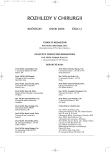-
Medical journals
- Career
A Partial Relaps of a Colorectal Carcinoma Metastatic Process Following Liver Surgery – a Multifactorical Study
Authors: V. Liška 1; V. Třeška 1; L. Holubec jr. 2; T. Skalický 1; A. Sutnar 1; O. Topolčan 2; J. Fínek 3
Authors‘ workplace: Chirurgická klinika FN Plzeň, přednosta prof. MUDr. V. Třeška, DrSc. 1; Centrální izotopová laboratoř LF UK Plzeň, přednosta prof. MUDr. O. Topolčan, CSc. 2; Radioterapeutické oddělení FN Plzeň, přednosta doc. MUDr. J. Fínek, Ph. D. 3
Published in: Rozhl. Chir., 2006, roč. 85, č. 2, s. 86-89.
Category: Monothematic special - Original
Overview
In the period of November 1999 – June 2003 78 patients with colorectal liver metastases (CLM) were operated at Department of Surgery, University Hospital in Pilsen. In multifactorial analysis there were evaluated these clinical parametres: age of patient, sex, localisation of primary tumor, Dukes classification, grading, staging and histology of primary tumor, histologicaly free resection margin, chemotherapy or actinotherapy after colorectal operation, type of liver resection, complications after liver surgery, radicality of liver surgery, lateralisation of liver metastatic process, number of metastases, blood transfusions, repeated liver surgery, volume of metastases. Kaplan-Meier method was used for evaluation of survival rate and disease free interval (DFI). Statistical analysis of studied clinical parametres was performed by Log-rank test and Wilcoxon test. The medium DFI after liver surgery was 16 months for all the patients (range 0–55 months), the medium DFI for patients after radical surgery was 18 months. The medium survival time after liver surgery for all the patients was 30 months (range 1–57 months), for patients after radical surgery it was 32 months, and for patients after palliative surgery the medium disease free interval was 29 months (range 5–30 months). The 4-year survival rate after the liver surgery was for all the patients 37%. The factors statistically significant for a disease free interval after liver surgery were bilaterality of metastatic process, the microscopically free resection line, radical surgical treatment versus RFA and unilaterality of metastatic process. The authors proved followed factors as statistically significant for survival rate: grading of colorectal cancer and age of patients. The prediction of early recurrence enables us to choose adequate surgical therapy or its extension by oncological therapy. More thorough follow up of patients with tendency to early recurrence of CLM helps to early diagnosis of relaps and it increases the posssibility of repeated liver surgery.
Key words:
liver metastases – colorectal carcinoma – early recurrence – prognostic factors – liver surgery – multifactorial analysis
Labels
Surgery Orthopaedics Trauma surgery
Article was published inPerspectives in Surgery

2006 Issue 2-
All articles in this issue
- Internal Hernias – Uncommon Causes of the Status Ileosus
- Do We Always Have the Possibility to Treat “lege artis”?
- Our Experience with Surgical Management of Injuries to Peripheral Nerves of the Upper Extremities
- Delayed Laparotomies in Blunt Injuries of the Abdomen: Incidence Rates, Causes, Mortality Rates and Hospitalization Times in a Group of 139 Operated Patients. A Retrospective Study
- Atypical Aneurysms of the Superficial Femoral Artery in a Young Patient
- Lung Resection for a Non-small Cell Carcinoma (Stage IV) with a Permanent Intracavitary Brachytherapy 125I
- An Axillary Metastasis as the First Sign of the Breast Carcinoma – A Case Review
- The Rectal Carcinoma Treatment History
- A Contribution of the Anorectal Angle Measurement According to Schiessel to Assessment of the Safe Distance of the Inferior Resection Line in the Rectal Carcinomas Surgical Procedures
- The First Case of Management of the Rectovaginal Fistule Using Transanal Endocsopic Microsurgery
- A Partial Relaps of a Colorectal Carcinoma Metastatic Process Following Liver Surgery – a Multifactorical Study
- Primary Tumors of the Duodenum and the Small Intestine in Our Clinical Study Subjects over a Ten-Year Period
- Perspectives in Surgery
- Journal archive
- Current issue
- Online only
- About the journal
Most read in this issue- The First Case of Management of the Rectovaginal Fistule Using Transanal Endocsopic Microsurgery
- Internal Hernias – Uncommon Causes of the Status Ileosus
- An Axillary Metastasis as the First Sign of the Breast Carcinoma – A Case Review
- Lung Resection for a Non-small Cell Carcinoma (Stage IV) with a Permanent Intracavitary Brachytherapy 125I
Login#ADS_BOTTOM_SCRIPTS#Forgotten passwordEnter the email address that you registered with. We will send you instructions on how to set a new password.
- Career

